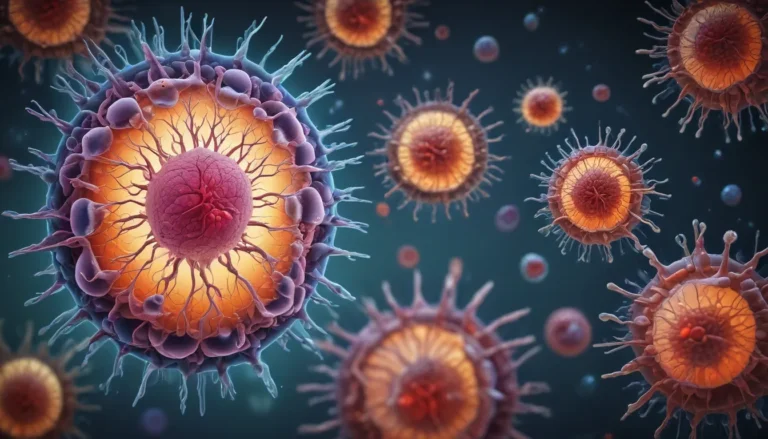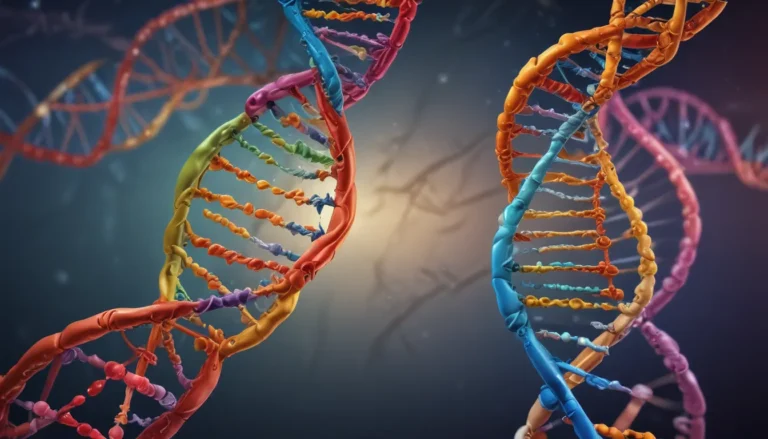A Note About Images: The images used in our articles are for illustration purposes only and may not exactly match the content. They are meant to engage readers, but the text should be relied upon for accurate information.
Gene expression, a fundamental process in biology, holds the key to understanding life’s complexities. It involves the conversion of genetic information stored in DNA into functional proteins that define the characteristics of living organisms. Dive into the intricate world of gene expression with these 17 extraordinary facts that illuminate its significance and unveil the molecular intricacies at play. Join us on a captivating journey into the realms of gene expression, where science and nature intersect to shape life as we know it.
The Essence of Gene Expression:
- Gene expression is akin to a genetic recipe book that guides cells in creating proteins vital for their functions. It is a tightly controlled process influenced by genetic factors and the environment.
- Each cell possesses its unique gene expression “playlist” to fulfill specific roles, akin to distinct music playlists for varying moods or activities. This tailored process is essential for development, health, and evolution.
Unveiling the Mechanisms of Gene Expression:
Gene expression is a multi-step process crucial for organismal functions and responses to external cues. It involves intricate regulatory mechanisms to ensure precise gene activation and prevent abnormalities.
– Cells possess elaborate control systems to regulate gene expression, activating a specific set of genes tailored for each cell type to maintain cellular integrity and function effectively.
Environmental Influence on Gene Expression:
External signals play a pivotal role in altering gene expression patterns, allowing cells to adapt to changing environments. Gene regulation, influenced by environmental factors, is vital for cellular responses and adaptations.
– Gene expression can be molded by environmental cues, showcasing the dynamic interplay between genes and external conditions in shaping cellular responses and functions.
The Genetics of Gene Expression:
Gene expression involves two primary steps, transcription, and translation, that convert genetic information into functional proteins essential for cellular activities.
– Various types of RNA, including messenger RNA (mRNA), transfer RNA (tRNA), and ribosomal RNA (rRNA), participate in the gene expression process, carrying out critical tasks for protein synthesis.
Epigenetic Influences on Gene Expression:
Epigenetic modifications, such as DNA methylation and histone alterations, can modulate gene expression patterns without altering the underlying DNA sequence, impacting development and disease susceptibility.
– The interplay between genetics and epigenetics shapes gene expression profiles, contributing to individual variations in gene expression and influencing disease predisposition and treatment responses.
Exploring Gene Expression in Development:
Gene expression is pivotal during embryonic development, orchestrating the activation of specific genes to form specialized cells and tissues. Disruptions in this process can lead to developmental disorders with far-reaching consequences.
– Precise gene expression patterns drive embryonic development, determining the formation of diverse cell types crucial for organismal growth and functionality.
Gene Expression in Health and Disease:
Altered gene expression patterns are implicated in various diseases, including cancer, neurological disorders, and metabolic conditions. Understanding these abnormalities offers insights into novel therapeutic strategies.
– Disruptions in gene expression dynamics can contribute to the pathogenesis of diseases, highlighting the importance of unraveling the molecular intricacies of gene regulation for therapeutic interventions.
The Role of Non-Coding RNA in Gene Expression:
Non-coding RNA molecules, such as microRNAs and long non-coding RNAs, regulate gene expression by interacting with messenger RNAs, providing additional layers of control and complexity in gene regulation.
– Non-coding RNA species play key roles in modulating gene expression patterns, fine-tuning cellular functions, and influencing disease processes through intricate regulatory mechanisms.
Advancements in Gene Expression Studies:
Transcriptomics offers a comprehensive approach to studying gene expression by analyzing the complete set of RNA molecules produced in cells or tissues, providing insights into gene regulation dynamics under varied conditions.
– Cutting-edge gene editing technologies like CRISPR-Cas9 enable precise alterations in gene sequences, revolutionizing research and therapeutic applications by offering unprecedented control over gene expression.
The Evolutionary Significance of Gene Expression:
Gene expression plays a vital role in evolutionary processes, contributing to the development of new traits and adaptations over time. Changes in gene expression patterns shape species diversity and evolutionary outcomes.
– The ability to regulate gene expression has been pivotal in driving evolutionary changes, sculpting genetic diversity and enabling organisms to adapt to changing environments and selective pressures.
Conclusion: Deciphering the Enigma of Gene Expression
In conclusion, gene expression stands as a cornerstone of biological processes, orchestrating the intricate dance of genetic information and protein synthesis that underpins life’s diversity. From the precision of gene regulation to the complexity of protein production, gene expression unveils nature’s elegance and reveals the interconnectedness of all living beings. As we continue to unravel the mysteries of gene expression through research and technological advancements, we deepen our understanding of life’s complexities and unlock new possibilities in biology and medicine.
FAQs: Navigating the Intricacies of Gene Expression
-
What is gene expression, and how does it function?
Gene expression refers to the process of utilizing genetic information stored in DNA to synthesize functional products, typically proteins. It involves transcription of DNA into RNA and translation of RNA into proteins. -
How is gene expression regulated, and what factors influence it?
Gene expression is regulated by a complex network of molecules and mechanisms, including transcription factors and epigenetic modifications. Environmental cues and genetic variations also impact gene expression dynamics. -
How many genes are expressed in a human cell, and what implications does this have?
Approximately 20,000-25,000 genes are estimated to be expressed in a human cell, but the actual number of proteins produced may be higher due to alternative splicing and post-translational modifications. This genetic diversity influences disease susceptibility and treatment responses. -
How does gene expression contribute to disease development, and can it be altered?
Aberrant gene expression patterns can lead to various diseases by disrupting protein functions or signaling pathways. Gene expression alterations can be influenced by environmental factors and genetic modifications, offering avenues for therapeutic interventions and disease management. -
What role does non-coding RNA play in gene expression, and how does it impact cellular functions?
Non-coding RNA molecules modulate gene expression by interacting with messenger RNAs and regulating protein synthesis. They contribute to the complexity of gene regulation and play crucial roles in fine-tuning cellular functions and disease processes.
Embark on a journey of discovery into the captivating realm of gene expression, where the marvels of genetics and biology converge to shape life’s intricate tapestry. Explore the nuances of gene regulation, transcriptomics, and epigenetic influences with curiosity and awe, as each fact unravels a new layer of understanding in this profound process. Trust in the authenticity and reliability of our shared insights as you navigate the complexities of gene expression and delve deeper into the mysteries of life.






